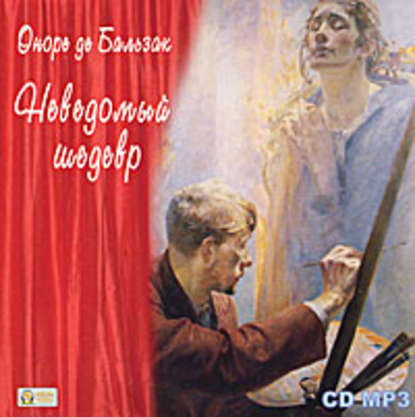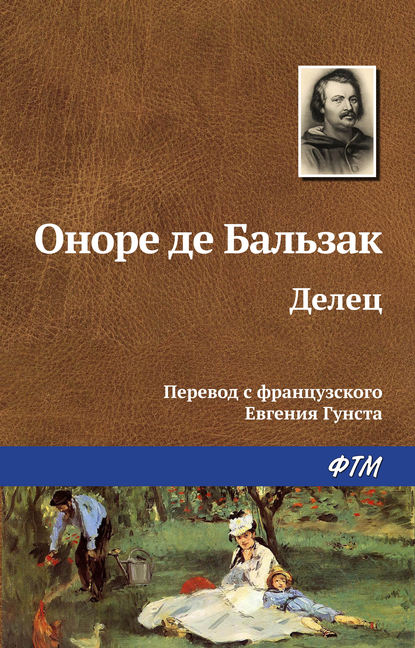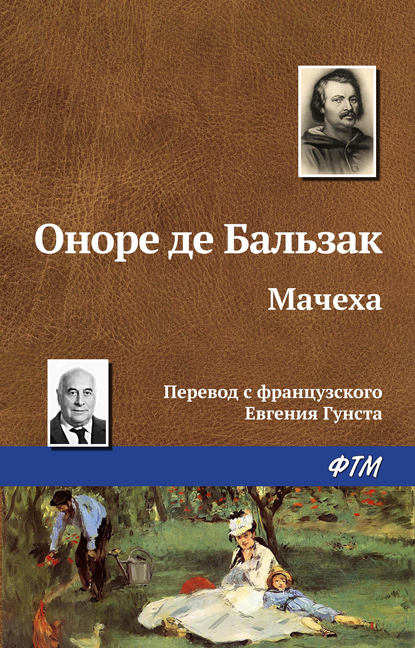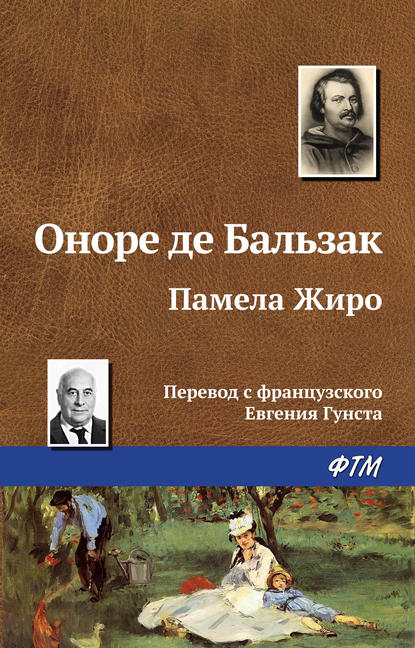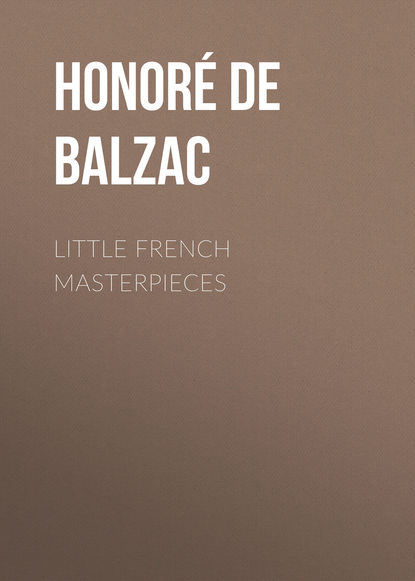
Полная версия
Little French Masterpieces
"But why, my dear master?" Porbus respectfully asked the old man, while the young man had difficulty in repressing a savage desire to strike him.
"Ah! it is this way," replied the little old man. "You have wavered irresolutely between the two systems, between drawing and colour, between the phlegmatic minuteness, the stiff precision of the old German masters, and the dazzling ardour and happy plenitude of the Italian painters. You have tried to imitate at the same time Hans Holbein and Titian, Albert Dürer and Paul Veronese. Assuredly that was a noble ambition! But what has happened? You have achieved neither the severe charm of precision, nor the deceitful magic of the chiaroscuro. In this spot, like melted bronze which bursts its too fragile mould, the rich, light colouring of Titian brings out too prominently the meagre outlines of Albert Dürer in which you moulded it. Elsewhere, the features have resisted and held in check the superb polish of the Venetian palette. Your face is neither perfectly drawn nor perfectly painted, and bears everywhere the traces of that unfortunate indecision. If you did not feel strong enough to melt together in the flame of your genius the two rival systems, you should have chosen frankly one or the other, in order to obtain the unity which represents one of the conditions of life. You are accurate only in the surroundings, your outlines are false, do not envelop each other, and give no promise of anything behind.
"There is a touch of truth here," said the old man, pointing to the saint's breast; "and here," he added, indicating the point where the shoulder came to an end. "But here," he said, reverting to the middle of the throat, "all is false. Let us not attempt to analyse anything; it would drive you to despair."
The old man seated himself on a stool, put his face in his hands, and said no more.
"Master," said Porbus, "I studied that throat very carefully in the nude figure; but, unfortunately for us, there are true effects in nature which seem improbable upon canvas."
"The mission of art is not to copy nature, but to express it! You are not a vile copyist, but a poet!" cried the old man, hastily interrupting Porbus with an imperious gesture. "Otherwise a sculptor would reach the end of his labours by moulding a woman! But try to mould your mistress's hand and to place it before you; you will find a horrible dead thing without any resemblance, and you will be obliged to resort to the chisel of the man who, without copying it exactly, will impart motion and life to it. We have to grasp the spirit, the soul, the physiognomy of things and of creatures. Effects! effects! why, they are the accidents of life and not life itself.
"A hand – as I have taken that example – a hand does not simply belong to the body; it expresses and carries out a thought, which you must grasp and represent. Neither the painter, nor the poet, nor the sculptor should separate the effect from the cause, for they are inseparably connected! The real struggle is there! Many painters triumph by instinct, without realising this axiom of art. You draw a woman, but you do not see her! That is not the way that one succeeds in forcing the secrets of nature. Your hand reproduces, without your knowledge, the model that you have copied at your master's studio. You do not go down sufficiently into the inmost details of form, you do not pursue it with enough enthusiasm and perseverance in its windings and its flights.
"Beauty is a stern and exacting thing which does not allow itself to be caught so easily; we must await its pleasure, watch for it, seize it, and embrace it closely, in order to compel it to surrender. Form is a Proteus much more difficult to seize and more fertile in evasions than the Proteus of fable; only after long struggles can one compel it to show itself in its real guise. You are content with the first aspect under which it appears to you, or at most with the second or third; that is not true of the victorious fighters! The invincible painters do not allow themselves to be deceived by all these subterfuges; they persevere until nature is reduced to the point where she must stand forth naked and in her real shape.
"That was the process adopted by Raphael," said the old man, removing his black velvet cap to express the respect inspired by the king of art; "his great superiority comes from the secret perception which, in him, seems determined to shatter form. In his figures form is what it really is in us, an interpreter for the communication of ideas and sensations, a vast poetic conception. Every figure is a world, a portrait, whose model has appeared in a sublime vision, tinged with light, indicated by an inward voice, disrobed by a divine figure, which points out the sources of expression in the past of a whole life. You give your women lovely robes of flesh, lovely draperies of hair; but where is the blood which engenders tranquillity or passion, and which causes special effects? Your saint is a dark woman, but this one, my poor Porbus, is a blonde! Your figures are pale, coloured spectres which you parade before our eyes, and you call that painting and art!
"Because you have made something which looks more like a woman than like a house, you think that you have attained your end; and, overjoyed because you no longer have to write beside your figures, currus venustus, or pulcher homo, like the first painters, you fancy that you are marvellous artists! Ah, no! you are not that yet, my good fellows; you will have to use up more pencils and cover many canvases before you reach that point! To be sure, a woman carries her head like that, she wears her skirts as this one does, her eyes languish and melt with that air of mild resignation, the quivering shadow of the eyelashes trembles thus upon her cheek! That is accurate and it is not accurate. What does it lack? A mere nothing, but that nothing is everything. You produce the appearance of life, but you do not express its overflow, that indefinable something which perhaps is the soul, and which floats cloud-like upon the outer envelope; in a word, that flower of life which Titian and Raphael discovered.
"Starting from the farthest point that you have reached, an excellent painting might perhaps be executed; but you grow weary too soon. The common herd admires, but the connoisseur smiles. O Mabuse, O my master," added this extraordinary individual, "you are a thief; you carried life away with you! – However," he continued, "this canvas is worth more than the painting of that mountebank of a Rubens, with his mountains of Flemish flesh powdered with vermillion, his waves of red hair, and his wilderness of colours. At all events, you have here colouring, drawing, and sentiment, the three essential parts of art."
"But that saint is sublime, my good man!" cried the young man, in a loud voice, emerging from a profound reverie. "Those two figures, of the saint and the boatman, have a delicacy of expression utterly unknown to the Italian painters; I don't know a single one of them who could have achieved the hesitation of the boatman."
"Does this little knave belong to you?" Porbus asked the old man.
"Alas! pray excuse my presumption, master," replied the neophyte, blushing. I am a stranger, a dauber by instinct, only lately arrived in this city, the source of all knowledge."
"To work!" said Porbus, handing him a pencil and a sheet of paper.
In a twinkling the stranger copied the Mary.
"O-ho!" cried the old man. "Your name?"
The young man wrote at the foot of the drawing: Nicolas Poussin.
"That is not bad for a beginner," said the strange creature who harangued so wildly. "I see that we can safely talk painting before you. I don't blame you for admiring Porbus's saint. It is a masterpiece for the world, and only those who are initiated in the most profound secrets of art can discover wherein it offends. But since you are worthy of the lesson and capable of understanding, I will show you how little is necessary to complete the work. Be all eyes and all attention; such an opportunity for instruction will never occur again perhaps. – Your palette, Porbus!"
Porbus went to fetch palette and brushes. The little old man turned up his sleeves with a convulsive movement, passed his thumb over the palette laden with colours, which Porbus handed to him, and snatched rather than took from his hands a handful of brushes of all sizes; his pointed beard twitched with the mighty efforts that denoted the concupiscence of an amorous imagination. As he dipped his brush in the paint, he grumbled between his teeth:
"These colours are good for nothing but to throw out of the window, with the man who made them! They are disgustingly crude and false! How can one paint with such things?"
Then, with feverish vivacity, he dipped the point of the brush in different mounds of colour, sometimes running through the entire scale more rapidly than a cathedral organist runs over his keyboard in playing the O Filii at Easter.
Porbus and Poussin stood like statues, each on one side of the canvas, absorbed in the most intense contemplation.
"You see, young man," said the old man, without turning – "you see how, by means of three or four touches and a little blue varnish, one can make the air circulate around the head of the poor saint, who surely must be stifling and feel imprisoned in that dense atmosphere! See how that drapery flutters about now, and how readily one can realise that the wind is raising it! Formerly it looked like starched linen held in place by pins. Do you see how perfectly the satinlike gloss with which I have touched the breast represents the supple plumpness of a maiden's flesh, and how the mixture of reddish brown and ochre warms the gray coldness of that tall ghost, in which the blood congealed instead of flowing? Young man, young man, what I am showing you now, no master could teach you! Mabuse alone possessed the secret of imparting life to figures. Mabuse had but one pupil, and that was I. I have had none, and I am growing old! You have intelligence enough to guess the rest from this glimpse that I give you."
While he spoke, the strange old man touched all the parts of the picture: here two strokes of the brush and there only one; but always so opportunely that one would have said that it was a new painting, but a painting drenched with light. He worked with such impassioned zeal that the perspiration stood upon his high forehead; he moved so swiftly, with such impatient, jerky little movements, that to young Poussin it seemed as if there must be in that strange man's body a demon acting through his hands and guiding them erratically, against his will. The superhuman gleam of his eyes, the convulsions which seemed to be the effect of resistance, gave to that idea a semblance of truth, which was certain to act upon a youthful imagination. The old man worked on, saying:
"Paff! paff! paff! this is how we do it, young man! Come, my little touches, warm up this frigid tone for me! Come, come! pon! pon! pon!" he said, touching up the points where he had indicated a lack of life, effacing by a few daubs of paint the differences of temperament, and restoring the unity of tone which a warm-blooded Egyptian demanded. "You see, my boy, it is only the last stroke of the brush that counts. Porbus has given a hundred, but I give only one. Nobody gives us credit for what is underneath. Be sure to remember that!"
At last the demon paused, and, turning to Porbus and Poussin, who were dumb with admiration, he said to them:
"This doesn't come up to my Belle Noiseuse; however, a man could afford to put his name at the foot of such a work. Yes, I would sign it," he added, rising and taking a mirror in which he looked at it. "Now let us go to breakfast," he said. "Come to my house, both of you. I have some smoked ham and some good wine! Despite the evil times, we will talk painting. We are experts. This little man," he added, tapping Nicolas Poussin on the shoulder, "has a facile touch."
Noticing the Norman's shabby jacket at that moment, he took from his belt a goat-skin purse, opened it, took out two gold-pieces and said, offering them to him:
"I will buy your sketch."
"Take it," said Porbus to Poussin, seeing him start and blush with shame, for the young neophyte had all the pride of the poor man. "Take it, he has the ransom of two kings in his wallet."
All three went down from the studio, and, discoursing on art as they walked, bent their steps to a handsome wooden house near Pont St. – Michel, the decorations of which, the knocker, the window-frames, and the arabesques, aroused Poussin's wondering admiration. The painter in embryo suddenly found himself in a room on the lower floor, before a bright fire, beside a table laden with appetising dishes, and, by incredible good fortune, in the company of two great artists overflowing with good nature.
"Young man," said Porbus, seeing that he stood in open-mouthed admiration before a picture, "don't look at that canvas too closely, or you will be driven to despair."
It was the Adam which Mabuse painted in order to obtain his release from the prison in which his creditors kept him so long. In truth, that face was of such startling reality that Nicolas Poussin began at that moment to understand the true meaning of the old man's confused remarks. The latter glanced at the picture with a satisfied expression, but without enthusiasm, and seemed to say: "I have done better than that!"
"There is life in it," he said; "my poor master surpassed himself; but it still lacks a little truth in the background. The man is thoroughly alive; he is about to rise and walk towards us. But the air, the sky, the wind, which we breathe and see and feel, are not there. And then there is only a man! Now the only man that ever came forth from the hands of God ought to have something of the divine, which he lacks. Mabuse himself said so with irritation, when he was not drunk."
Poussin glanced at the old man and Porbus in turn, with restless curiosity. He approached the latter as if to ask him the name of their host; but the painter put his finger to his lips with a mysterious air, and the young man, intensely interested, kept silence, hoping that sooner or later some chance remark would enable him to discover the name of his host, whose wealth and talent were sufficiently attested by the respect which Porbus manifested for him and by the marvellous things collected in that room.
Seeing a superb portrait of a woman upon the oaken wainscoting, Poussin exclaimed:
"What a beautiful Giorgione!"
"No," replied the old man; "you are looking at one of my first daubs."
"Tu-dieu! then I must be in the house of the god of painting!" said Poussin, ingenuously.
The old man smiled like one long familiar with such praise.
"Master Frenhofer!" said Porbus, "couldn't you send for a little of your fine Rhine wine for me?"
"Two casks!" replied the old man; "one to pay for the pleasure which I enjoyed this morning in seeing your pretty sinner, and the other as a friendly gift."
"Ah! if I were not always ill," rejoined Porbus, "and if you would let me see your Belle Noiseuse, I might be able to paint a picture, high and wide and deep, in which the figures would be life-size."
"Show my work!" cried the old man, intensely excited. "No, no! I still have to perfect it. Yesterday, towards night," he said, "I thought that it was finished. The eyes seemed to me moist, the flesh quivered; the tresses of the hair moved. It breathed! Although I have discovered the means of producing upon flat canvas the relief and roundness of nature, I realised my error this morning, by daylight. Ah! to attain that glorious result, I have thoroughly studied the great masters of colouring, I have analysed and raised, layer by layer, the pictures of Titian, that king of light; like that sovereign painter, I have sketched my figure in a light shade, with soft, thick colour – for shading is simply an accident, remember that, my boy! – Then I returned to my work, and by means of half-tints, and of varnish, the transparency of which I lessened more and more, I made the shadows more and, more pronounced, even to the deepest blacks; for the shadows of ordinary painters are of a different nature from their light tones; they are wood, brass, whatever you choose, except flesh in shadow. One feels that, if a figure should change its posture, the shaded places would not brighten, and would never become light. I have avoided that fault, into which many of the most illustrious artists have fallen, and in my work the whiteness of the flesh stands out under the darkness of the deepest shadow.
"I have not, like a multitude of ignorant fools, who fancy that they draw correctly because they make a carefully shaded stroke, marked distinctly the outer lines of my figure and given prominence to the most trivial anatomical details, for the human body does not end in lines. In that regard, sculptors can approach the truth more nearly than we can. Nature demands a succession of rounded outlines which shade into one another. Strictly speaking, drawing does not exist! – Do not laugh, young man! However strange that remark may seem to you, you will understand its meaning some day. – The line is the means by which man interprets the effect of light upon objects; but there are no lines in nature, where everything is full; it is in modelling that one draws, that is to say, that one removes things from the surroundings in which they are; the distribution of light alone gives reality to the body! So that I have not sharply outlined the features; I have spread over the outlines a cloud of light, warm half-tints, the result being that one cannot place one's finger upon the exact spot where the outline ends and the background begins. Seen at close quarters, the work seems cottony and to lack precision; but two yards away, everything becomes distinct and stands out; the body moves, the forms become prominent, and one can feel the air circulating all about. However, I am not satisfied yet; I still have doubts.
"Perhaps I should not have drawn a single line; perhaps it would be better to attack a figure in the middle, devoting one's self first to the prominences which are most in the light, and passing then to the darker portions. Is not that the way in which the sun, that divine painter of the universe, proceeds? O Nature, Nature! who has ever surprised thee in thy flights? I tell you that too much knowledge, like ignorance, ends in a negation. I doubt my work!"
The old man paused, then continued:
"For ten years, young man, I have been working, but what are ten short years when it is a question of contending with nature? We have no idea how long a time Pygmalion employed in making the only statue that ever walked!"
The old man fell into a profound reverie, and sat with staring eyes, mechanically toying with his knife.
"He is conversing with his spirit now!" said Porbus in an undertone.
At that word Nicolas Poussin became conscious of the presence of an indefinable artistic curiosity. That old man with the white eyes, staring and torpid, became in his eyes more than a man; he assumed the aspect of an unreal genius living in an unknown sphere. He stirred a thousand confused ideas in his mind. The mental phenomenon of that species of fascination can no more be defined than one can define the emotion aroused by a ballad which recalls the fatherland to the exile's heart. The contempt which that old man affected to express for the most beautiful works of art, his wealth, his manners, the deference with which Porbus treated him, that work kept secret so long – a work of patience and of genius doubtless, judging by the head of a Virgin which young Poussin had so enthusiastically admired, and which, still beautiful, even beside Mabuse's Adam, bore witness to the imperial workmanship of one of the princes of art – everything, in short, about the old man went beyond the bounds of human nature.
The one point which was perfectly clear and manifest to Nicolas Poussin's fertile imagination was a complete image of the artistic nature, of that irresponsible nature to which so many powers are entrusted, and which too often misuses them, leading cold reason, the honest bourgeois, and even some experts, through innumerable rock-strewn paths, where there is nothing so far as they are concerned; whereas that white-winged damsel, unreasoning in her fancies, discovers these epic poems, châteaux, and works of art. A sardonic but kindly nature; fertile but sterile. Thus, to the enthusiastic Poussin, that old man had become, by an abrupt transfiguration, art itself, art with its secrets, its unruly impulses, and its reveries.
"Yes, my dear Porbus," Frenhofer resumed, "I have failed thus far to meet an absolutely flawless woman, a body the outlines of which are perfectly beautiful, and whose colouring – But where is she to be found in real life?" he asked, interrupting himself, "that undiscoverable Venus of the ancients, so often sought, of whom we find only a few scattered charms? Oh! to see for an instant, but a single time, that divine, complete, in a word, ideal nature, I would give my whole fortune. Aye, I would seek thee in the abode of the dead, O divine beauty! Like Orpheus, I would go down into the hell of art to bring life back thence."
"We may go away," said Porbus to Poussin; "he neither hears nor sees us now."
"Let us go to his studio," suggested the wonder-struck youth.
"Oh! the old fellow knows how to keep people out. His treasures are too well guarded for us to obtain a glimpse of them. I have not awaited your suggestion and your longing before attacking the mystery."
"So there is a mystery?"
"Yes," Porbus replied. "Old Frenhofer is the only pupil whom Mabuse would ever consent to take. Having become his friend, his saviour, his father, Frenhofer sacrificed the greater part of his property to humour Mabuse's passions; in exchange Mabuse bequeathed to him the secret of relief, the power of imparting to figures that extraordinary appearance of life, that touch of nature, which is our never-ending despair, but of which he was such a thorough master that one day, having sold and drunk the flowered damask which he was to wear on the occasion of Charles V.'s entry into Paris, he attended his master in a garment of paper painted to represent damask. The peculiar brilliancy of the fabric worn by Mabuse surprised the Emperor, who, when he attempted to compliment the old drunkard's patron, discovered the fraud.
"Frenhofer is passionately devoted to our art, and he looks higher and farther ahead than other painters. He has given much profound thought to the subject of colouring and to the absolute accuracy of lines; but he has studied so much that he has reached the point where he is uncertain of the very object of his studies. In his moments of despair he declares that drawing does not exist and that only geometrical figures can be made with lines; which is going beyond the truth, for with lines and with black, which is not a colour, a human figure maybe drawn; which proves that our art, like nature, is made up of an infinite number of elements: drawing furnishes a skeleton, colour gives life; but life without the skeleton is much less complete than the skeleton without life. In short, there is one thing which is more true than any of these, and that is that practice and observation are everything with a painter, and that, if reason and poetic sense quarrel with the brush, we arrive at doubt, like our excellent friend here, who is as much madman as painter. A sublime artist, he was unfortunate enough to be born rich, which permitted him to go astray; do not imitate him! Work! Painters ought not to meditate, except with brush in hand."
"We will find our way there!" cried Poussin, no longer listening to Porbus, and undeterred by doubts.
Porbus smiled at the young stranger's enthusiasm, and, when they parted, invited him to come to see him.
Nicolas Poussin walked slowly back to Rue de la Harpe, and passed, unperceiving, the modest house in which he lodged. Ascending his wretched staircase with anxious haste, he reached a room high up beneath a roof supported by pillars, a simple and airy style of architecture found in the houses of old Paris. Beside the single, dark window of that room sat a girl, who, when she heard the door, sprang at once to her feet with a loving impulse; she recognised the painter by the way he raised the latch.





